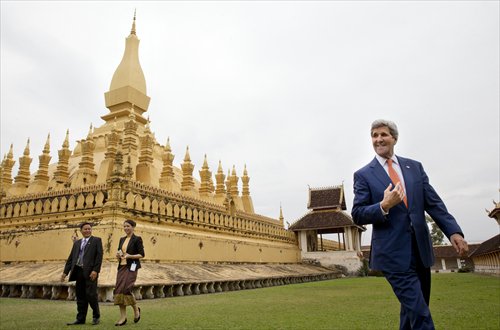Kerry to visit China with N.Korea agenda
Pressing Beijing may lead to more chaos: experts

US Secretary of State John Kerry (right) tours the That Luang Stupa with Phouvieng Phothisane, acting director of the Vientiane Museums (far left) and Tata Keovilay, attached to the US embassy, in Vientiane on Monday. Kerry arrived in Laos late on Sunday in a rare high-level visit by a US diplomat. Photo: AFP
US Secretary of State John Kerry is expected to pressure China on the North Korea nuclear issue in his upcoming visit to Beijing, but this may lead to more chaos on the Korean Peninsula, experts said Monday.
Kerry is also expected to use the trip, which also takes him to Laos and Cambodia, to promote the US "rebalance to Asia" strategy.
Kerry plans on seeking a tough response from China on sanctioning North Korea for its recent nuclear test, given that the US believes "there is more that China can do," according to the website of the US Department of State.
During his Beijing visit on Tuesday and Wednesday, Kerry also plans to discuss issues related to the South China Sea and political space for NGOs.
Referring to Kerry's China visit, China's foreign ministry spokesperson Hua Chunying emphasized China's wish that Kerry's visit will help with "healthy" Sino-US ties.
"We hope that through this visit the two sides could strengthen cooperation in various areas and promote the healthy and stable development of bilateral ties," Hua said at a regular press conference on Monday.
China welcomes Kerry to discuss proper measures to sanction North Korea, but his visit clearly has ulterior motives to contain China, experts said.
No matter if it's the North Korea issue or the South China Sea issue, the US is attempting to use a unified strategy to contain China by driving a wedge between China and its neighbors, and to realize its ultimate goal of a "rebalance to Asia" strategy, Zha Xiaogang, a research fellow with the Shanghai Institute for International Studies, told the Global Times.
Overestimated influence
"Kerry is likely to press China to adopt an oil embargo on North Korea, as the US believes that China's oil exports to North Korea have led to the growth of its nuclear capability," Lü Chao, a professor with the Liaoning Academy of Social Sciences, told the Global Times.
The US and South Korea both vowed to impose harsher sanctions on North Korea after Pyongyang announced on January 6 that it had successfully carried out its first hydrogen bomb test.
In the meantime, the US has been preaching to the world that China should take the main responsibility for the current intensified nuclear crisis in North Korea, but in reality, a hostile US attitude toward North Korea is the core of the issue, experts said.
"The US continues to ask China to shoulder this groundless responsibility and impose tough sanctions without touching on the fundamental reasons, which cannot solve the North Korean nuclear crisis. Instead, it may lead to further chaos on the Korean Peninsula," Da Wei, an American studies expert at the China Institutes of Contemporary International Relations, told the Global Times.
Experts said that the US has overestimated China's influence on Pyongyang, given that ties between the two have experienced a chill after Kim Jong-un took office in 2011.
Discussions over major issues between China and North Korea no longer exist, Lü said. "For example, North Korea did not inform China about its recent nuclear test as it had done in previous tests."
China has voiced objections to all of North Korea's four tests, including the previous ones in 2006, 2009 and 2013.
After the nuclear test, the US first flew a B-52 bomber over South Korea, and then planned to deploy its missile defense system in South Korea.
Both the firing range of a B-52 and the missile system could reach China, so the US aim was never deterrence to North Korea, but to counter Chinese influence with its allies, Lü said.
The consensus among experts is that denuclearizing the Korean Peninsula needs cooperation with all concerned parties, and any sanctions should be done under the auspices of the Six-Party Talks.
ASEAN as a counterpoint
Kerry's visit to China is part of his three-day visit to Asia which first takes him to Laos, the 2016 chair of the 10-member Association of Southeast Asian Nations (ASEAN) on Monday, before he heads to Cambodia and then Beijing.
The US has tried to bolster ASEAN as a counterpoint to Chinese regional power by visiting Laos and Cambodia, both of which have not taken a radical attitude toward China on the South China Sea issue as the Philippines and Vietnam have done, especially at a time when Laos is currently taking its turn as chair of ASEAN, Zha said.
Laos wants to see maritime rights respected and avoid a military build-up in the South China Sea, Kerry said on Monday, after a meeting with Laotian Prime Minister Thongsing Thammavong, Reuters reported.
Laos is unlikely to take strong positions over the South China Sea as Kerry had expected, as it has wider interests with China, Zha said.